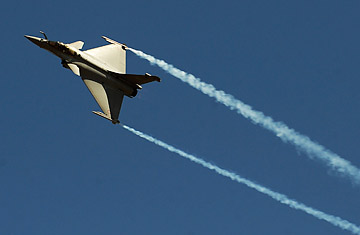
A French Rafale combat aircraft performs during the Aero India 2011 inauguration day in Bangalore on Feb. 9, 2011. India is preparing to sign a $20 billion contract for 126 Rafales
One item in India's much anticipated new budget raised a couple of eyebrows: military spending has been increased by almost 17% to over $42 billion, up from $36 billion in 2011-12. Funds to buy new weapons and systems were also raised by 15.7%. Finance Minister Pranab Mukherjee said the hike was to meet defensive needs, but it underlined India's efforts to match the military buildup of its regional rivals — primarily China. At the beginning of March, Beijing increased its defense budget by 11.2%, taking it up to $106.4 billion. India is now preparing to sign several military deals, including a $20 billion contract for 126 Rafale medium multirole combat aircraft from France.
With the possible exception of military expenditures, however, the anticipation over the budget proved to be oversold. Designed to win back voter confidence in the run-up to federal elections in 2014, the plan is modest and doesn't pack any big surprises. Analysts were not impressed. "The budget could have been a very good opportunity for Pranab Mukherjee to make very drastic changes," Vineet Agarwal, director of KPMG India, told TIME. "Obviously this is no great boost to the economy ... This is a normal, progressive budget." It is unlikely to still the political storm swirling around Prime Minister Manmohan Singh's Administration. Already one of his key coalition allies threatened to quit last week after the government raised train fares for the first time in almost a decade.
Those allies are unlikely to be mollified by a cap on the country's fuel subsidy. A proposed shrinking of the cushion — from the current 2.5% of GDP to just under 2% — would be substantial enough for consumers to feel the pinch at the gas pumps. Mukherjee explained it as geared to accelerate "the pace of reforms and improve supply-side management of the economy." It will help the government reach its fiscal-deficit target and leave more money to be spent on social programs. But middle class may respond to offering their votes to Singh's opponents instead. For the moment, however, the government seems keen to appeal to the poor who will benefit from the increased allocations for social programs.
The Congress-led United Progressive Alliance (UPA) has been battling a slowing of the economy, coalition tensions, loss of voter confidence owing to a string of corruption scandals over the past two years and a severe beating in the recently held state elections. An economic survey released last week says the pressure on the UPA is taking a toll on the India's economic growth. But Bharat Karnad, a political analyst with the New Delhi–based Centre for Policy Research, believes politics trumped economic reform in the formation of the budget. "Even assuming [the Congress Party] were in a majority, I doubt they would have departed from their manifesto promises [better education, rural infrastructure development, etc.]," Karnad says. "I am not sure that this is so much about coalition dharma than the Congress party trying to secure another five years in office." Karnad continues, "It's a budget that could be sold as forward-looking but that took care of their constituencies. [Mukherjee] compromised between being an out-and-out reformer and an out-and-out populist."
Mukherjee also presented a rosier outlook for the economy in his budget speech on Friday morning. In it, he envisioned the economy growing by 7.6% in the next fiscal year, up from around 6.9% in the current year (but below the 8.4% growth the previous financial year). Mukherjee said that India was not untouched by the global crisis and that industrial performance was dragging it down. "Though we have been able to limit the adverse impact of the slowdown in our economy, this year's performance has been disappointing," Mukherjee said. "But it is also a fact that in any cross-country comparison, India still remains among the front-runners in economic growth." He said there were clear indications of a turnaround with "signs of recovery in coal, fertilizer, cement and electricity sectors." In an interview after the budget was released, Prime Minister Singh echoed his Finance Minister's sentiments, saying the biggest achievement of his government was that they were able to protect the growth rate of the "economy much better than other economies." But now, can his government protect itself from the growing dissatisfactions of the world's largest democracy?
